RBSE Solutions for Class 5 English Chapter 3 The Rats and the Elephants
Rajasthan Board RBSE Solutions for Class 5 English Let's Learn English Chapter 3 The Rats and the Elephants Textbook Exercise Questions and Answers.
RBSE Class 5 English Solutions Chapter 3 The Rats and the Elephants
Activity - I
A. Write T for true and F for false statement.
सही कथन के लिए "T" तथा गलत कथन के लिए 'F' लिखिए।
1. The elephants were very hungry. They were looking for food. ( )
2. The elephants destroyed the homes of the rats because they disliked them. ( )
3. The king of the rats promised to help the elephants when needed. ( )
4. The elephants were shouting for help. ( )
Answer:
1. (F) 2. (F) 3. (T) 4. (T)
B. Look at the following images and arrange them in correct order by numbering them.
निम्नलिखित चित्रों को देखें तथा उन पर संख्या अंकित कर सही क्रम में लगाइये।
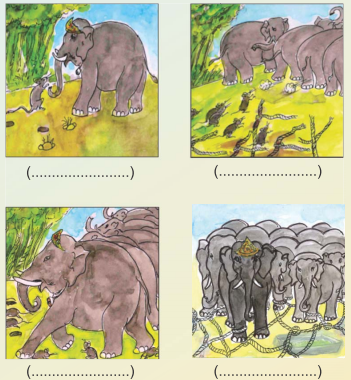
Answer:
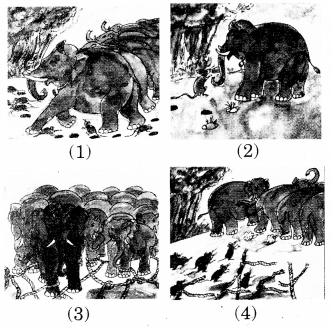

C. Answer the following questions :
निम्नलिखित प्रश्नों के उत्तर दीजिए :
Question 1.
Why did the elephants pass through the area where the rats lived ?
हाथी उस क्षेत्र से क्यों गुजरे जहाँ चूहे रहते थे?
Answer:
The elephants passed through that area where the rats lived because they were in search of water.
हाथी उस क्षेत्र से गुजरे जहाँ चूहे रहते थे क्योंकि वे पानी की तलाश में थे।
Question 2.
Why did the king of rats request the elephant chief to guide his herd through another route ?
चूहों के राजा ने हाथियों के सरदार से अपने झंड को किसी और मार्ग से जाने का निर्देश देने का अनुरोध क्यों किया?
Answer:
The king of rats requested the elephant chief to guide his herd through another route because many homes of the rats were destroyed under the big feet of the elephants and some rats were also killed.
चूहों के राजा ने हाथियों के सरदार से अपने झुंड को किसी और मार्ग से जाने का निर्देश देने का अनुरोध इसलिए किया क्योंकि चूहों के अनेक घर हाथियों के पांवों के नीचे आकर तबाह हो गए थे तथा कुछ चूहे भी मार डाले गए थे।
Question 3.
Why did the king of rats promise to help the elephants when needed ?
चूहों के राजा ने हाथियों से यह वायदा क्यों किया कि आवश्यकता पड़ने पर वह उनकी मदद करेंगे?
Answer:
The king of rats promised to help the elephants when needed because Gajraj had accepted his request to take the other way to the pond.
चूहों के राजा ने आवश्यकता पड़ने पर हाथियों की सहयता करने का वायदा किया क्योंकि गजराज ने किसी अन्य मार्ग से तालाब पर जाने की उसकी प्रार्थना को स्वीकार कर लिया था।

Question 4.
Why were the elephants shouting one day ?
एक दिन हाथी चीख-पुकार क्यों कर रहे थे?
Answer:
The elephants were shouting for help because they were caught in the traps kept by some hunters.
हाथी इसलिए मदद के लिए चीख-पुकार कर रहे थे क्योंकि वे कुछ शिकारियों के जाल में फंस गये थे।
Question 5.
How did the rats help the elephants?
चूहों ने हाथियों की मदद किस प्रकार से की?
Answer:
The rats started biting the ropes with their sharp teeth. Soon, all the elephants were set free.
चूहों ने अपने तेज दांतों द्वारा रस्सियों को काटना प्रारम्भ कर दिया। एवं शीघ्र ही सारे हाथी स्वतन्त्र हो गए।
Activity - II.
A. Complete the following sentences by choosing appropriate words from the box.
बाँक्स में से सही शब्दों को चुनकर वाक्यों को पूरा कीजिए।
promised, trap, danger, herd, ready, pond, quickly, realized
1. Mahesh is always .......... to play cricket.
2. He ................. finished his homework and went out to play.
3. Yesterday, I saw a frog in the ............... behind my house.
4. My father ................ to take me to the fair today.
5. The fox was caught in a ..........
6. Suman ................ her mistake and said sorry to Geeta.
7. I saw a ............ of sheep grazing in the field.
8. The lion was about to pounce on the zebra. But the zebra sensed the .............. and ran away.
Answer:
1. ready
2. quickly
3. pond
4. promised
5. trap
6. realized,
7. herd
8. danger.

B. In the lesson, you came across two words-herd' and 'heard'. Did you notice what is special about them? They have different spellings and different meanings but they are spoken the same way. That is, there is no difference in their pron Such words are called 'homophones'.
पाठ में आपके समक्ष दो शब्द आए-'herd' और 'heard' । क्या आपने ध्यान दिया कि इनके बारे में क्या बात विशेष है? इनकी वर्तनी भिन्न है एवं इनके अर्थ भी भिन्न हैं, परन्तु इनके उच्चारण का तरीका एक है। मतलब यह कि इनकी उच्चारण विधि में कोई भिन्नता नहीं है। ऐसे शब्दों को 'समध्वनिक शब्द' कहते हैं।
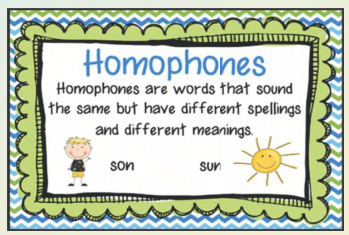
'Homophones' वे शब्द हैं जिनकी वर्तनी तथा अर्थ अलग होते हैं लेकिन ध्वनि समान होती है।
A pair of homophones is given within the brackets for each of the sentences below. Select suitable word to complete the sentences.
नीचे दिए गए वाक्यों में प्रत्येक के साथ कोष्ठक में समध्वनिक शब्दों का एक जोड़ा दिया गया है। सही शब्द चुनकर वाक्यों को पूरा कीजिए।
1. Mr Jain has a daughter and a ........... (sun/son)
2. There are seven days in a ........... (weak/week)
3. I couldn't ............ what the teacher said. (here/hear)
4. The lion ran after a ....... (dear/deer)
5. My younger sister is ............. (too/two) years old.
6. Raju will ............. (by/buy/bye) a new cap from the fair.
7.............. your name in bold letters. (right/write)
8. Sunil ............. how to ride a bicycle. (nose/knows)
9. India ............ the final match. (one/won)
10. Carrot is a ............ vegetable. (root/route)
11. There are two ........... of plants in my garden. (rows/rose)
Answer:
1. son,
2. week,
3. hear,
4. deer,
5. two,
6. buy,
7. Write,
8. knows,
9. won,
10. root,
11. rows.

Activity - III
In the lesson you read, पाठ में आपने पढ़ा कि When the rats were playing, they heard loud shouts of elephants.' This sentence talks about an action which took place when another action was in progress. Here are a few more examples, look at them and see how they are constructed.
यह वाक्य एक ऐसे क्रियाकलाप के विषय में बताता है जो उस समय घटित हुआ, जब एक अन्य क्रियाकलाप चल रहा था। यहाँ ऐसे ही कुछ और उदाहरण दिए गए हैं, उन्हें देखिए एवं उनकी संरचना को समझिए।
When Sumit was doing his homework, his mother called him for dinner. When we were playing football, Mohan hurt his leg. Now, complete the following sentences using correct form of verb, given in the bracket.
अब, कोष्ठक में दी गई क्रिया के सही रूप का प्रयोग | कर, निम्नलिखित वाक्यों को पूरा कीजिए।
1. When Monu was returning from school, he ............. a ten-rupee note under a tree. (find)
2. When I was doing my homework, my friend .............. to meet me. (come)
3. When the students were making a noise, the teacher ............. them in a group activity................ (engage)
4. When Meenu was feeling hungry, her mother ............. halwa for her. (cook)
5. When my father was taking a bath, his mobile phone .............. (ring)
6. When Nidhi was learning her lesson, her younger brother .............. a glass of water for her. (bring)
Answer:
1. found
2. came
3. engaged
4. cooked
5. rang
6. brought
Activity - IV
Form a pair with your partner. One of you will play the role of Mooshakraj and the other one will act as Gajraj. On the basis of the story you have read, pick up suitable lines from the box below and enact a dialogue between Mooshakraj and Gajraj. Your teacher will help you.
अपने सहपाठी के साथ जोड़ा बनाएं। आप दोनों में से एक विद्यार्थी मूषकराज की भूमिका निभाएगा एवं दूसरा गजराज बनेगा। पढ़ी गई कथा के आधार पर, नीचे दिए गए बॉक्स में से उपयुक्त पंक्तियाँ खोजिए एवं मूषकराज तथा गजराज के मध्य वार्तालाप का सम्पादन कीजिए। आपके शिक्षक आपकी सहायता करेंगे।
|
• Dear Gajraj. I urgently need your help. |
Answer:
Mooshakraj : Dear Gajraj, I urgently need your help.
Gajraj : Yes Mooshakraj. Tell me how I can help you.
Mooshakraj : You and your herd passed through this way to reach the pond this afternoon, and destroyed many of our homes under your big feet. What's more, some of our rats were also crushed to death.
Gajraj : That's really sad to know Mooshakraj.
Mooshakraj: Please don't use this way, or we will suffer more death and destruction.
Gajraj: But dear Mooshakraj, if we don't drink water from the pond in this hot weather, we will die of thirst.
Mooshakraj : Dear Gajraj, I've a solution. There's another route that leads to the pond. If you guide your herd through that route, the rats will be saved, and you can quench your thirst too.
Gajraj : That's a great idea Mooshakraj. I'll tell my elephants to take the other route.
Mooshakraj: Thank you so much Gajraj. I'll not forget this kind gesture or yours.

Activity - V.
Write five sentences describing how you help your elder brothers and sisters.
पाँच वाक्य लिखकर वर्णन कीजिए कि आप किस प्रकार अपने बड़े भाईयों एवं बहिनों की सहायता करते हैं।
Answer:
1. I help them in arranging their study room.
2. I bring water for them.
3. I never make a noise when they study.
4. I keep their books' almirah clean.
5. I never resist when they watch their favourite programe on television.
Answer:
1. मैं उनके अध्ययन-कक्ष को व्यवस्थित करने में मदद करता हूँ।
2. मैं उनके लिए पीने का पानी लाकर देता हूँ।
3. जब वे पढ़ते हैं तो मैं कभी शोर नहीं मचाता हूँ।
4. मैं उनकी किताबों की आलमारी साफ रखता हूँ।
5. जब वे टी.वी. पर अपना पसंदीदा कार्यक्रम देखते हैं तो, मैं कभी उनका विरोध नहीं करता हूँ।
Q. Are we all of the same size ?
क्या हम सभी एक ही आकार के हैं?
Answer:
No, we all are not of the same size.
नहीं, हम सभी एक ही आकृति के नहीं हैं।
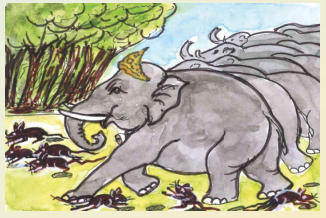
Q. Can a smaller animal help a .. bigger animal ?
क्या एक छोटा जानवर एक बड़े जानवर की मदद कर सकता है?
Answer:
Yes, a smaller animal can help a bigger animal.
हाँ, एक छोटा जानवर एक बड़े जानवर की मदद कर सकता है।
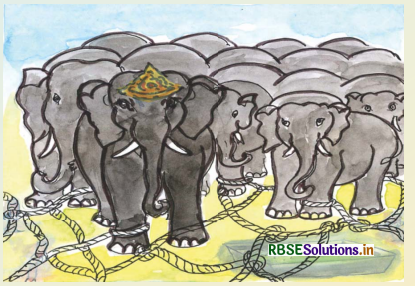
Q. You're often asked to help your younger sisters and brothers. Do you help them ?
आपको अक्सर अपनी छोटी बहिनों एवं भाईयों की मदद करने लिए कहा जाता है। क्या आप उनकी मदद करते हैं?
Answer:
Yes, I often help my younger sister and brother.
हाँ, मैं अक्सर अपनी छोटी बहिन एवं भाई की मदद करता/करती हूँ।
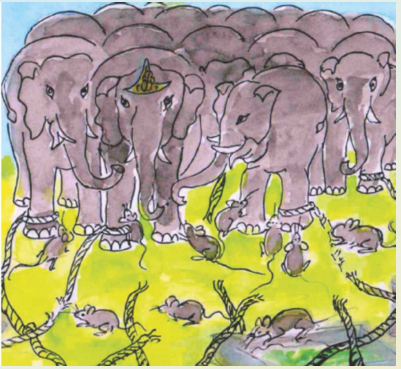

Q. How do your younger brothers and sisters help you ?
आपके छोटे भाई एवं बहिनें किस प्रकार आपकी मदद करते हैं?
Answer:
My younger brother and sister help me in my daily routine work.
मेरे छोटे भाई-बहिन मेरे रोजमर्रा के कार्य में मदद करते हैं।
Let's read आइए पढ़ें
The Rats and the Elephants Summary and Translation in Hindi
Long, long ..... the rats. (Pages 56-57)
Word-meanings-ago (अगो) = पहले। forest (फॉरिस्ट) = जंगल। herd (हाड) = झुंड। passed (पास्ट) = गुजरे। area (एरिया) = स्थान/ क्षेत्र। search (स:च) = तलाश । destroyed (डिस्ट्रॉइड) = तबाह हो गये। killed (किल्ड) = मार डाले गए। requested (रिक्वेस्टिड) = अनुरोध किया। pond (पॉन्ड) = तालाब। accepted (एक्सेप्टिड) = स्वीकार की। without (विदाउट) = बिना। disturbing (डिस्ट:बिंग) = परेशान करना। route (रूट) = मार्ग।
हिन्दी अनुवाद-बहुत समय पहले, चूहों का एक झण्ड जंगल में सुखपूर्वक रहता था। एक दिन हाथियों का एक झुंड पानी की तलाश में उस स्थान से गुजरा। उनके बड़े पांवों के नीचे आकर चूहों के अनेक घर तबाह हो गए। कुछ चूहे भी मारे गए। चूहों का राजा मूषकराज हाथियों के राजा गजराज के पास गया और उससे अनुरोध किया कि वह अपने झुंड को किसी और मार्ग से तालाब की ओर ले जाए। उसने अनुरोध को स्वीकार कर लिया और हाथियों को निर्देश दिया कि वे चूहों को परेशान किये बिना अन्य मार्ग पकड़ लें।
Mooshakraj..........elephants. (Page57)
Word-meanings-pleased (प्लीज़्ड) = प्रसन्न। thanked (थैक्ट) = आभार प्रदर्शित किया। promised (प्रॉमिस्ट) = वादा किया। help (हेल्प) = सहायता करना। needed (नीडिड) = आवश्यकता महसूस की। hearing (हिअरिंग) = सुनकर। laughed (लाफ्ट्) = हंसे। thinking (थिंकिंग) = सोचकर। could (कुड) = कर सकते थे।
हिन्दी अनुवाद- मूषकराज गजराज से बहुत खुश एवं प्रसन्न हुआ। उसने उसका आभार प्रकट किया एवं उससे वादा किया कि जब भी आवश्यकता होगी, चूहे सदैव हाथियों की मदद करने के लिए तैयार रहेंगे। यह सुनकर हाथियों का झुंड यह सोचकर हँस पड़ा कि इतने छोटे चूहे किस प्रकार से बड़े हाथियों की मदद करेंगे।
After a ....... that sound. (Pages 57-58)
Word-meanings-a few = कुछ। months (मन्थ्स ) = महीने। fine (फ़ाइन) = उत्तम, सुहावना। were playing (वर प्लेइंग) = खेल रहे थे। loud (लाउड) = जोरदार । shouts (शाउट्स) = चीखें। direction (डिरेक्शन) = दिशा | realized (रिअलाइज़्ड) = समझ गया। strong (स्ट्रॉग) = शक्तिशाली! along (अलाँग) = साथ। sound (साउन्ड) = आवाज़। danger (डेन्जर) = विपत्ति।
हिन्दी अनुवाद-कुछ महीनों बाद एक सुहावने दिन, जब चूहे खेल रहे थे, उन्हें तालाब की दिशा की ओर से हाथियों की जोरदार चीखें आती हुई सुनाई दी। मूषकराज समझ गया कि हाथी किसी विपत्ति में थे। उसने अपने झुंड के कुछ शक्तिशाली चूहों को अपने साथ आने का निर्देश दिया और उस आवाज़ की दिशा की ओर चल दिये।

Near the pond.....small size. (Page58)
Word-meanings-near (निों) - निकट। saw (साँ) = देखा। caught (कॉट) = पकड़ा। trap (ट्रैप) = जाल। kept (केष्ट्) = रखा। hunters (हन्टज़) = शिकारी। quickly (क्विक्लि) = फुर्ती से। started (स्टा:टिड) = शुरू किया। biting (बाइटिंग) = काटना। ropes (रोप्स) = रस्सियाँ । sharp (शा:प) = तेज। felt (फ़ेल्ट) = महसूस किया। making fun (मेकिग फ़न) = हंसी उड़ाना।
हिन्दी अनुवाद-तालाब के निकट उन्होंने कुछ शिकारियों द्वारा बिछाए गए जाल में हाथियों को फँसे देखा। चूहों ने फर्ती से रस्सियों को अपने तेज दांतों द्वारा काटना शुरू कर दिया। जल्दी ही हाथी मुक्त हो गए। उन्होंने चूहों का आभार प्रकट किया एवं उनके छोटे आकार की हंसी उड़ाने के लिए शर्मिन्दा भी हुए।
